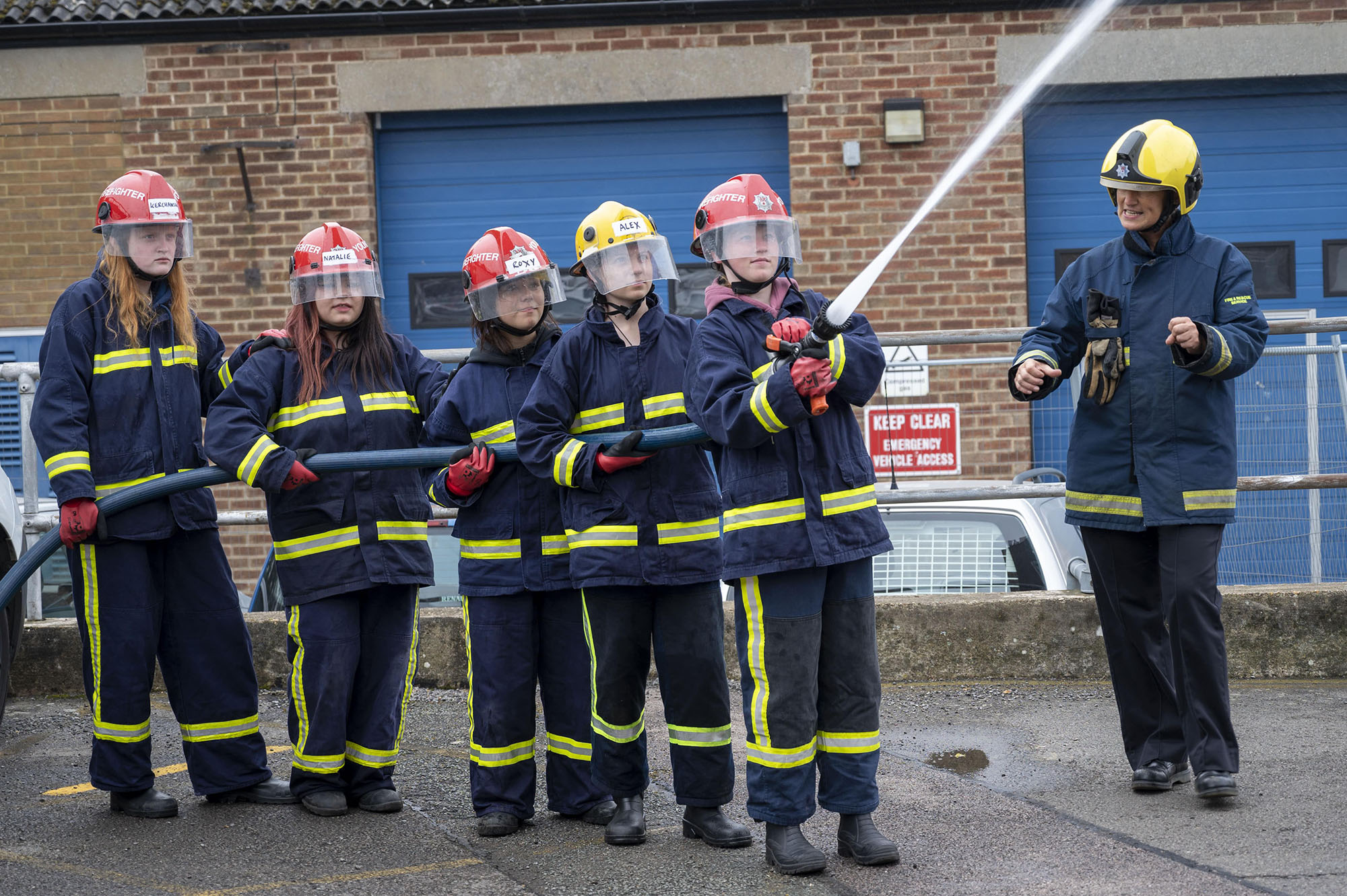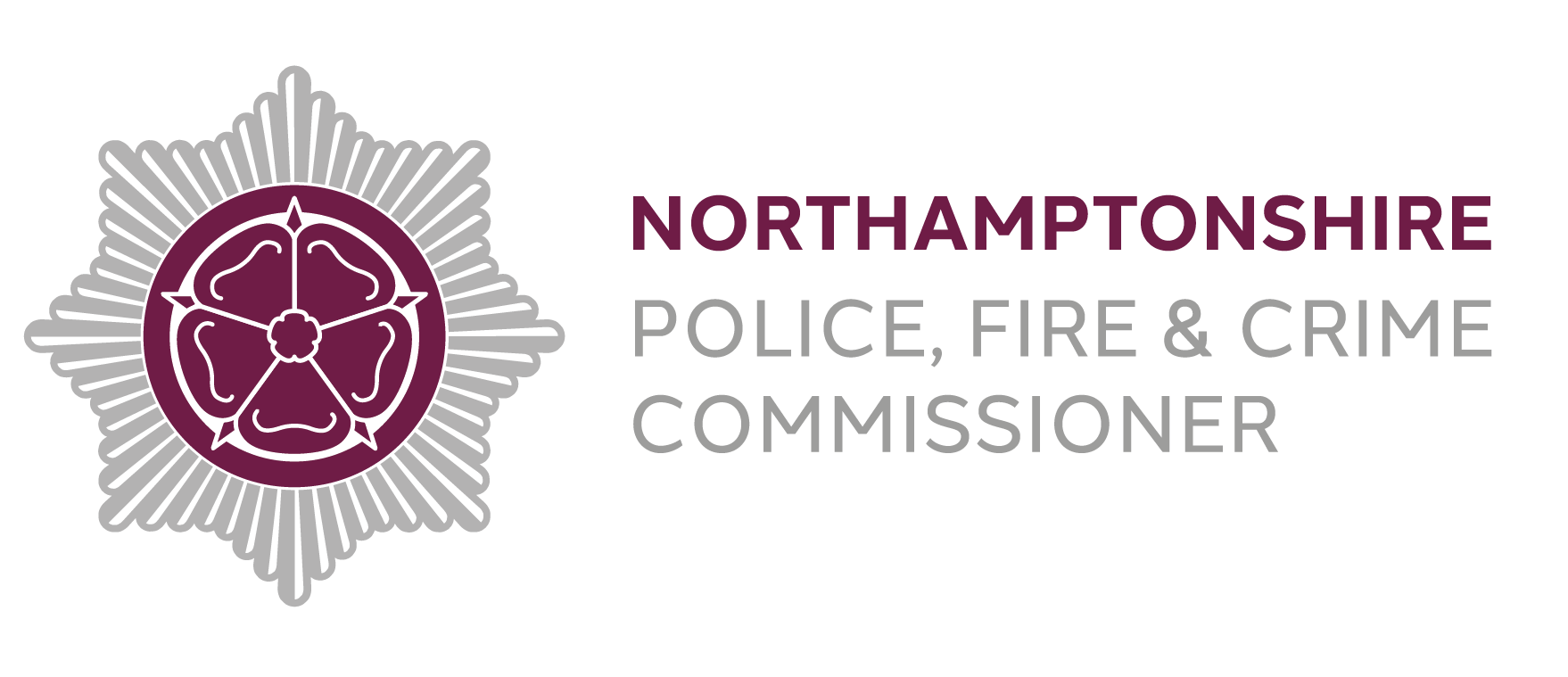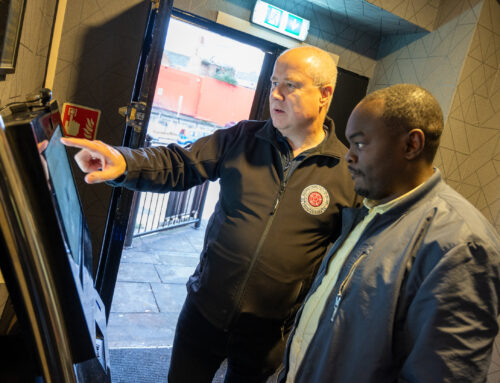
New green motorbikes to help Neighbourhood Policing
A new environmentally friendly fleet of hybrid motorbikes will become tools to help Northamptonshire Police improve its accessibility and visibility to members of the public.
The new three-wheeled bikes will be used by neighbourhood policing teams across the county and demonstrate that Northamptonshire Police is leading the way in sustainable transport for emergency services.
Eight of the new motorbikes, which run on both battery charge and petrol, have been purchased following the completion of an initial pilot scheme earlier this year that tested the technology in a policing context.
Stephen Mold, Northamptonshire’s Police, Fire and Crime Commissioner, said: “Not only does this give us a chance to revolutionise our fleet but we also hope it will allow our officers to be more visible and approachable when they are out on the beat.
“Any learnings from how these bikes improve the fleet can potentially be applied to our Fire Service fleet too, so I will be watching with great interest to see how they make Northamptonshire Police better able to engage with its communities in what is a green and sustainable way.
“And most importantly, I want to see how they help us to make Northamptonshire safer by helping us to catch and deter more criminals.”
The motorbikes, which have been designed by Northamptonshire based company White Motorcycle Concepts, reduce emissions by up to 50 per cent compared with a similar non-hybrid model. This will help the Force with its target to reduce carbon emissions by 2030.
The batteries are compact and easily removed, and spares can be carried on the bike or conveniently stored back at the station – meaning the bikes do not need downtime for charging and can continue to be used for patrol. The design also provides a three-pin plug and USB ports, creating a mobile workstation for a busy neighbourhood officer and allowing them to spend even more time on their beat.
Inspector Nathan Murray, from Northamptonshire Police, added: “This will improve accessibility to both rural and town locations for neighbourhood officers. They will also help us to be more visible in tackling the priorities that members of the public have been telling us they want to see us tackle. Not only that but it is showing that Northamptonshire Police is putting the green agenda and innovation at the forefront of our thinking.”

Women role models help to build students’ confidence
A pilot programme for girls run by Police Fire and Crime Commissioner Stephen Mold’s team and Northamptonshire Fire and Rescue Service has helped to promote confidence and resilience.
The programme saw 11 girls from Kettering Buccleuch Academy selected to attend a two-day pilot course at Kettering Fire Station. The girls, all aged between 12 and 15, were kitted up in fire gear and completed training drills, a ‘rat run’ obstacle course in the dark that encouraged teamwork, and a road traffic collision scenario which made them think about safety and first aid.
Members of the Early Intervention and Adverse Childhood Experience (ACE) Team from the OPFCC meanwhile delivered classroom-based sessions on inspirational women, identifying healthy and unhealthy relationships and how to deal with their mental, physical, and social wellbeing.
The course gave the girls the opportunity to meet and interact with positive women role models, as well as to equip them with the skills and confidence to deal with issues that occur throughout their life.
Michelle Bates, Youth Engagement Officer for Northamptonshire Fire and Rescue Service, said: “It was fantastic to see the girls come out of their shell as the day progressed. They seemed to really enjoy the practical aspects and it was great to talk to them about being a woman in the fire service and that it’s a job that they could definitely do if they wanted to.”
Police, Fire and Crime Commissioner Stephen Mold added: “This pilot programme came about after we visited the school and heard some of the accounts of harassment that some girls had already encountered in their lives. Every girl and woman has the right to feel safe and confident and should never have to be subjected to that kind of behaviour.”

Funding for road safety projects
The Police, Fire and Crime Commissioner is reminding community groups, charities, schools, and parish councils that grants of between £500 and £5,000 are available to help improve road safety initiatives across the county.
Already benefiting from a grant is Grange Primary Academy in Kettering who worked with local social enterprise, Brightwayz to build on their school travel policy that promotes active travel to school and keeping children safe on the roads around the school.
Grange Primary Academy was awarded £3,000 that was used to buy a bike shed and bikes for pupils to use. The funding also enabled Brightwayz to work with the school to set up a ‘School Play Street’ event earlier this year. The road directly outside the school gates was closed and pupils were able to
play safely in the street, scooting, cycling, and participating in other sporting activities in a car-free zone.
The event was supported by emergency services, residents, parents, and local councillors and provided a fun and interactive platform to highlight how much safer the vicinity around the school would be if the school gates and access routes were kept clear of vehicles.
Alison Holland, founder of Brightwayz encourages more schools to take advantage of the Police, Fire and Crime Commissioner’s funding. She said: “This funding opportunity is ideal for schools that really want to be proactive about addressing the school run problem and road safety issues.
“We really enjoy working with local schools who are leading on this such as Grange Primary Academy and Kettering Buccleuch Academy and this funding from the OPFCC is what has made it possible.”

Survival day helps to curb gang involvement
Early intervention – preventing children going down a dangerous pathway in life – is a key priority in Stephen Mold’s Police, Fire and Crime Plan.
Early Intervention takes many forms: one is the Elite Survival Day, designed to give young people who are on the cusp of gang involvement a chance to escape their everyday life, learn new skills and build a rapport with the people who are trying to help them.
The training day sees them build shelters and hammocks, create fires, and learn to tie knots under the watchful eye of former marine John Sullivan, who has been running Elite Survival Training for the last 12 years.
The Elite Survival Day forms part of the Community Initiative to Reduce Violence (CIRV) programme which aims to reduce gang violence and involves multiple agencies.
Having seen the day in action, Police, Fire and Crime Commissioner Stephen Mold said: “It’s really important to me to stop crime happening and to work with young people at an early stage.
“A lot of the young people who attend these days will have been excluded from school and are missing authority figures in their lives and people they can trust. This event has allowed them to build some bonds and it means we can start working to put them on a better pathway and have honest conversations with them about their life choices.”
As well as six Navigators – serving police officers who will work closely with the child – the CIRV program team has two Adverse Childhood Experience (ACE) officers embedded from the Commissioner’s team.
Support for a child referred to CIRV can include referring them to organisations where they can speak with former gang members, or in this case, bringing them to a new part of the world and teaching them valuable skills.
PC Jordan-Bradly Taylor, a CIRV Navigator, said: “It’s good to give them opportunities and see them be children for the first time. It can take about 400 hours to get a young person under the age of 18 to fully trust a professional. We don’t have that many hours to make an impact on their lives, so having something like this is invaluable.”

Commissioner welcomes Home Office Minister to Darby House
Police, Fire and Crime Commissioner Stephen Mold welcomed Crime and Home Office Minister Tom Pursglove MP to Darby House earlier this month.
Mr Pursglove, who is also the MP for Corby & East Northamptonshire, stopped by for a first visit to the joint Commissioner, police and fire building in Wellingborough to spend the morning with the Commissioner and Chief Constable Nick Adderley.
The meeting was an opportunity for Tom to find out more about the performance improvements Northamptonshire Police has been making and the Commissioner’s plans to improve public confidence in the county’s police.
It allowed the Commissioner to explain his Safer Streets projects, which are helping to improve the safety of women enjoying the night-time economy in Kettering and Northampton, as well as improving crime prevention measures and promoting safety on the Queensway estate in Wellingborough.
The visit also focused on a discussion regarding the funding formula for police forces in the United Kingdom, with both the Commissioner and the Chief Constable making the case for Northamptonshire Police to receive a fairer funding package from the Government.
They also discussed the ongoing recruitment campaign to reach a target of having 1,500 police officers by March 2023 – the most the Force will have ever had – as well as legislating to protect our must vulnerable residents through better data sharing.

Chief Fire Officer bids farewell after six years
Chief Fire Officer Darren Dovey is to step down next month after more than six years in the top role at Northamptonshire Fire & Rescue Service.
And in his final few weeks, the Chief has published his last Annual Report, where he says he leaves the Service ‘in a much stronger position, and in good shape to deal with new challenges’.
Darren’s time at the helm has been one of unprecedented events, including the financial crisis that engulfed Northamptonshire County Council in 2018, and then the transferral of governance to the Police, Fire and Crime Commissioner in the following year.
Darren Dovey said: “This was undoubtedly the biggest change the Service has been through since its formation in 1974, effectively turning itself from a department of the county council into a standalone Fire Authority for the first time.
“In the three years since, the country has been through the COVID pandemic, where NFRS not only had to continue to deliver its core services but also support the wider county response to the emergency.”
Rounding up his annual report, Darren – who will be retiring after 35 years overall in the Fire Service – said: “It has been an interesting and challenging six and a half years as Chief Fire Officer, to say the least.
“Reflecting on that time, I am amazed at how great the change is that we have been through, particularly in the last three years, and I am also immensely proud of how staff across the whole of the Service have risen to the challenges we faced and how very much we have achieved.”
Police, Fire and Crime Commissioner Stephen Mold said: “It will be sad to say goodbye to Darren, who has done a wonderful job of steering the Service through some very challenging times and making the transition to OPFCC governance an incredibly smooth one.
“He has been a great support to me throughout his tenure and I wish him all the best for his retirement.”

Help for landowners to prevent flytipping
Fly-tipping is a blight in the county, but Police, Fire and Crime Commissioner (PFCC) Stephen Mold is helping landowners to tackle the issue of illegally dumped waste with his Fly-Tipping Grant Scheme, which offers grants of between £500 and £1,500.
Under the scheme, farmers and other private landowners can apply through their local council for a grant from the PFCC towards the cost of having the fly-tipped waste removed and of putting prevention measures in place to make the land less vulnerable to fly-tippers in the future.
Positive interventions supported by funding have resulted in prosecutions, the most recent being a £1,300 fine for fly-tipped waste on private land near Irthlingborough.
Northamptonshire’s Police, Fire and Crime Commissioner Stephen Mold said: “Fly-tipping is an offence and is taken seriously in Northamptonshire as this latest conviction shows. It is also hugely detrimental to the environment, a fire hazard and can be costly to remove. I am committed to tackling this issue and have a grant scheme where private landowners can seek financial support to remove fly tipped waste and install deterrents to make their land less vulnerable.”
Fly-tipped waste on private land is not the responsibility of the local authorities and can be costly for individuals to remove. Residents in the county often raise this issue with the Commissioner who is working with the two unitary councils to tackle the issue.
Anyone interested in applying for a grant to remove fly-tipping on their private land, or to contribute to prevention interventions can find more details and information on how to apply on the OPFCC website.





